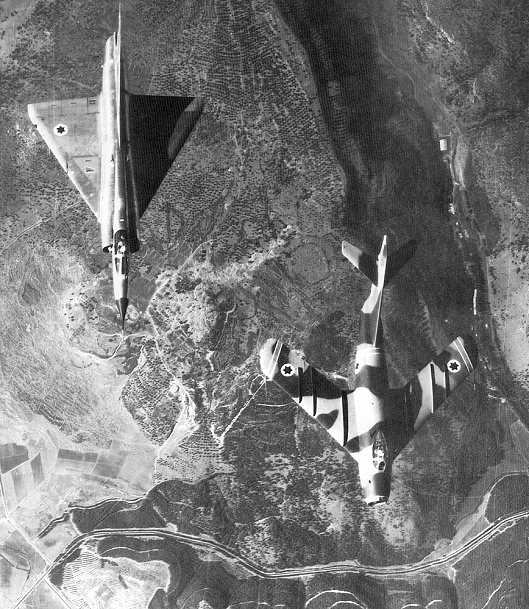
Israeli Mirage with former Syrian MiG-17
The mid-1960s saw a great deal of tension between Israel and its Arab neighbors, especially Syria with its attempt to divert rivers that originate locally and provide Israel with a substantial amount of its water. Israel continuesly attacked these works and the heavy machinery they employed, which often resulted in skirmishes with the Syrian military and the downing of several Syrian MiGs.
In the beginning of 1967 Syria pronounced that Israel had amassed 16 Brigades on its northern border, poised to attack Syria. No Israeli denial, even an invitation for the Soviet ambassador to visit the border area, could expose this false allegation, probably made to instill Egypt's aid in Syria's quarrel with Israel. Packed with Syria in a mutual defence treaty, president Nazer of Egypt decided to create a show of force on Israel's southern border, by which to deter it from taking any action on its northern frontier. On May 14th, 1967, Egypt begun drafting all its reserve military forces and an order was issued for ground forces to cross the Suez Canal from mainland Egypt into the Sinai Peninsula, moving closer to the Israeli
border. On May 16th, the Egyptian High Command issued a demand that all U.N. forces, in place since the 1956 ceasefire agreements, leave the Sinai peninsula. On May 19th the Secretary General of the U.N. agreed to this demand and withdrew the U.N. whose positions were taken over by Egypt. Finally, on May 23rd Egypt closed off the Tiran Straits to Israeli shipping, effectively blocking access to Israel's southern sea-port of Eilat.
The weak objections made by Israel's western allies in response to such an aggressive move, encouraged Egypt into making outragous demands of Israel in order to dissipate the tension (such as recognizing the Tiran straits and Gulf of Aqaba as Egyptian territorial waters). When these were rejected,
Anti-Israeli rhetoric peaked and Egyptian troop movements into the Sinai were stepped up. Syrian also increased the readiness of its armed forces and Jordan advanced two armour brigades towards its border with Israel.

The Israeli government, headed by Levi Eskol, hoped to ease the tension using diplomatic methods instead of the military methods offered by the then chief of staff, Itzhak Rabin. On May 28th however, Nazer demanded that Israel hand over the port of Eilat to Egyptian control. On May 30th, King Hussein of Jordan signed a defence treaty with Egypt, effectively placing his army under Egyptian command, and on June 4rd another such treaty was signed with Iraq. With no chance of a diplomatic settlement of the dispute and having found itself threathened on three fronts, from Syria in the north, Egypt in the south and Jordan and Iraq in the East, the Israeli government finally voted to go to war. Pre-empting the oncoming Arab attack, Israel decided to launch the war itself.
The planning of operation "Moked" (Focus) had began in 1963 and from that moment on, up-to-date intelligence was routinely gathered on all Arab air forces, air bases and aircraft. The objective of the entire operation was achieving air superiority within 6 hours. Israel had concluded long before that dogfights were an inefficient way to achieve this and that enemy aircraft must be caught on the ground. The plan called for an attack on Arab airfields, first runways to prevent enemy aircraft from taking off and then repeated passes to destroy these aircraft. The scope of the operation went far beyond preparation for the various sorties, and the IAF actually underwent great changes in order to prepare itself for its successful implementation. Command and control structures were modernized, technical training of ground crews was stepped up to allow shorter times between sorties, new weapons were designed and much more. The plan itself had been completed long before the outbreak of the crisis, but with the increasing tension was quickly brought up to date with current intelligence.
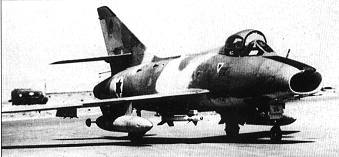
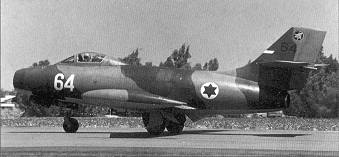
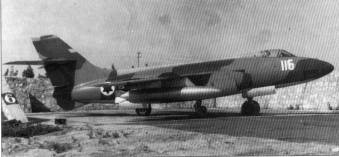
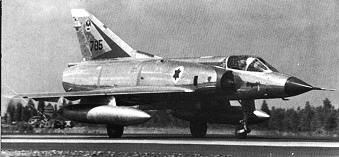
Having voted to go to war, the Israeli government set June 5th, 1967, as the date for the implementation of operation "Moked", coinciding with an armoured push into the Sinai peninsula. The war was then still limited to Egypt, hoping that the other Arab countries would not become involved in the conflict.
 back to the IDF/AF page
back to the IDF/AF page